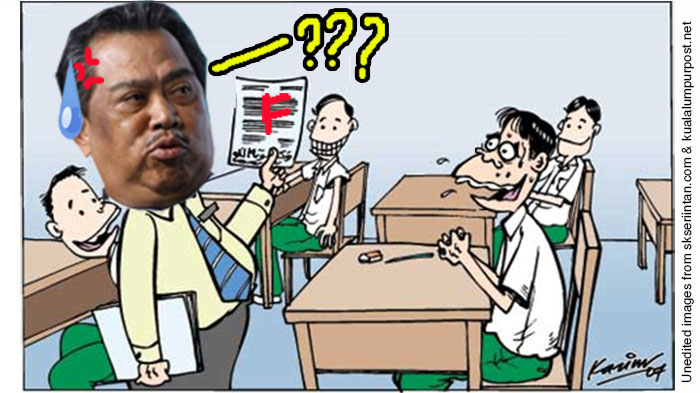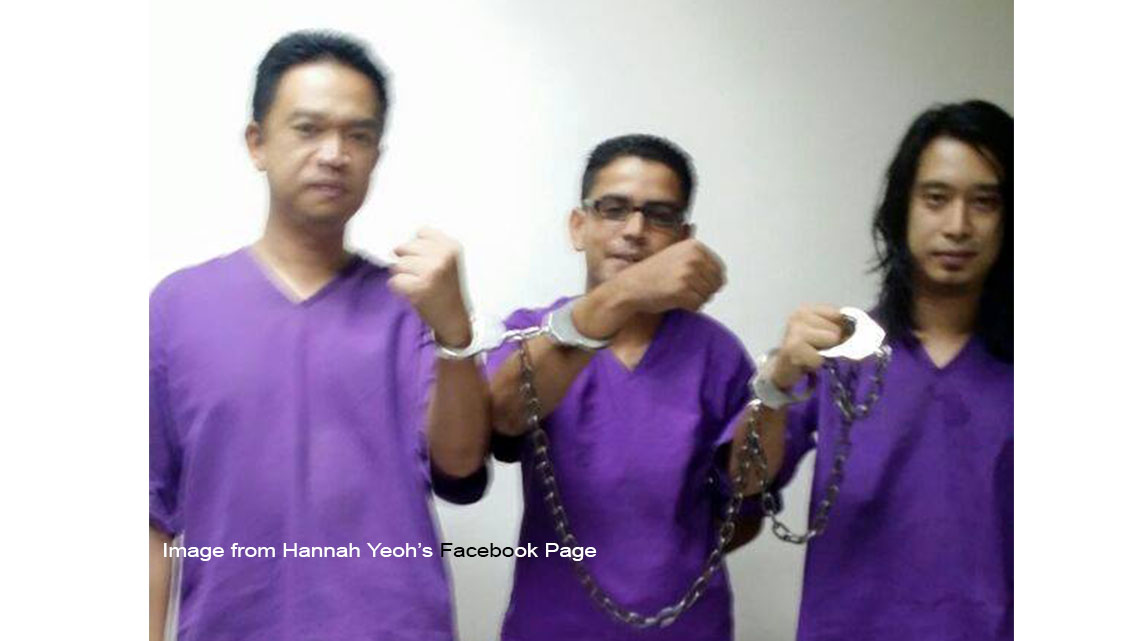What happened today in 1987 that scarred the Malaysian media
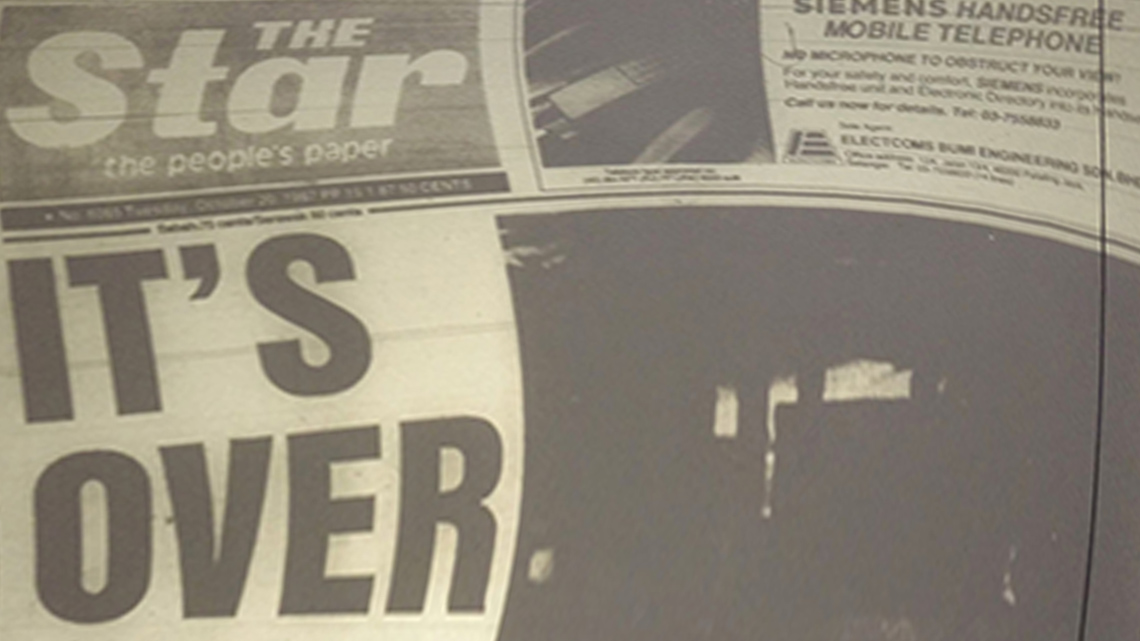
- 9.5KShares
- Facebook9.2K
- Twitter30
- LinkedIn26
- Email67
- WhatsApp153
Tomorrow’s (or today depending on when you’re reading this) the day Anwar goes on his sodomy trial. After the hullaballoo over Universiti Malaya’s lockdown of his speech scheduled for today, we’re again faced with more concerns about the right to free speech and all that bass. However, this article isn’t about that (sorry). While many see Anwar’s banning from speaking at UM as yet another incidence of the stifling of free speech in the country, today also coincides with another event where the roots of free speech was yanked out and left to wither.
The story that we’ll tell you is a scary one, one that every Malaysian journalist has on the back of their mind when writing a report, one that causes an involuntary shudder of fear in an editor approving a story for publishing. And there’s a good reason for that – this is a story about how hundreds of people in the newspaper industry almost lost their jobs for doing their jobs. This is a story about how three newspapers were shut down for doing the worst possible thing a newspaper can do – reporting the news. And it happened on this day 27 years ago.
The 7 trending headlines of 1987
With every story, there needs to be a main character to carry the plot. In the case of this one, we’ve decided to go with The Star due to the availability of microfilm slides in the National Library, its role in history, and that because this writer can’t read Chinese. That being said, let’s focus on the….Star of this story.
The set-up
1987 was a rather stormy time for most Malaysians as the country was just recovering from a worldwide recession and a questionable sense of fashion.

While leopard print tights may be distressing to us today, the ordinary citizen was more concerned with the possibility of a second May 13 incident. The issues are condensed below, with somewhat accurate headlines we’ve made up. Click on these to link to the corresponding article from The Star.
- Dr. M’s Leadership Under Threat – Dr. Mahathir’s leadership was being challenged and criticized by UMNO members, creating a rift within the party itself. This worsened with accusations of election fraud and tampering during the UMNO general assembly.
- Chinese Schools Unhappy Over Placement of Non Chinese-Educated HMs – The education ministry’s decision to send non Chinese-educated teachers for senior and principal positions in Chinese schools, with the calls of rallies from both the Chinese School Association (Dong Jiao Zong) a counter-rally from UMNO Youth. Fun fact: Anwar was education minister at the time.
- Racial Divide in Varsities Worrying – Growing racial tension and segregation in local universities
- Christian Missionaries Convincing Muslims to Convert – (False) Allegations that Muslims were being preached to by Christians to abandon Islam
- Orang Asli Prisoners of Their Own Land – Increased awareness of how Orang Asli in East Malaysia have been mistreated for the sake of logging projects
- Mammoth UMNO Rally Brings Fears of Racial Violence – Plans for a “mammoth” UMNO rally to celebrate the party’s 41st anniversary – not long after the UMNO Youth counter rally in headline number 2.
- Man Shot by Soldier in Chow Kit – A Malay soldier running amok and firing an M16 in Chow Kit, killing a Chinese man with a ricochet (bounce-off-something-and-hit-you) bullet.
Bearing in mind that mentioning the word “Internet” back then would have gotten you the blank stares usually reserved for engineers explaining the finer details of the internal combustion engine to his dinner date, the regular Malaysian would only have one primary source to keep up with what was happening in the country and the world around them : The newspaper.
The Tunku’s Little Star
“Many more snubs I suffered in silence. Then the little Star fell on my lap and I remained silent no more.” – Tunku Abdul Rahman, via the Star
Every hero needs a mentor. Harry Potter had Dumbledore, the X-Men had Professor X, Spiderman had Aunt May, and… you get the idea.
The Star’s Professor X was our Bapa Kemerdekaan, Tunku Abdul Rahman.
Back when The Star was still a small Penang-based newspaper, the original owner convinced Tunku to take a controlling interest and grow it into something beyond the struggling regional newspaper that it was, and he did while also reconnecting with many Malaysians through his weekly column, “As I see it…”
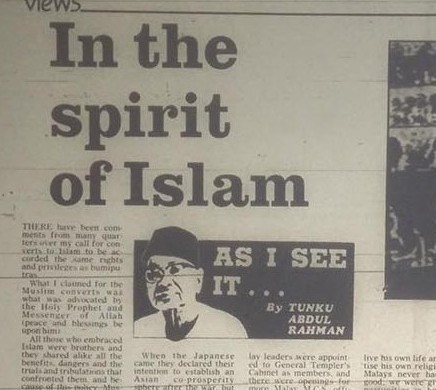
While it was a popular column, there were others who also felt that he was pushing certain liberal agendas to the point that “senior administrators confessed to having a dread of Mondays (when his column was published)” and some even called for him to be detained under the ISA. In this vein, The Star was often called (we assume with a sly whisper and a snigger) Suara Tunku Abdul Rahman.
The government decides to get rid of weeds
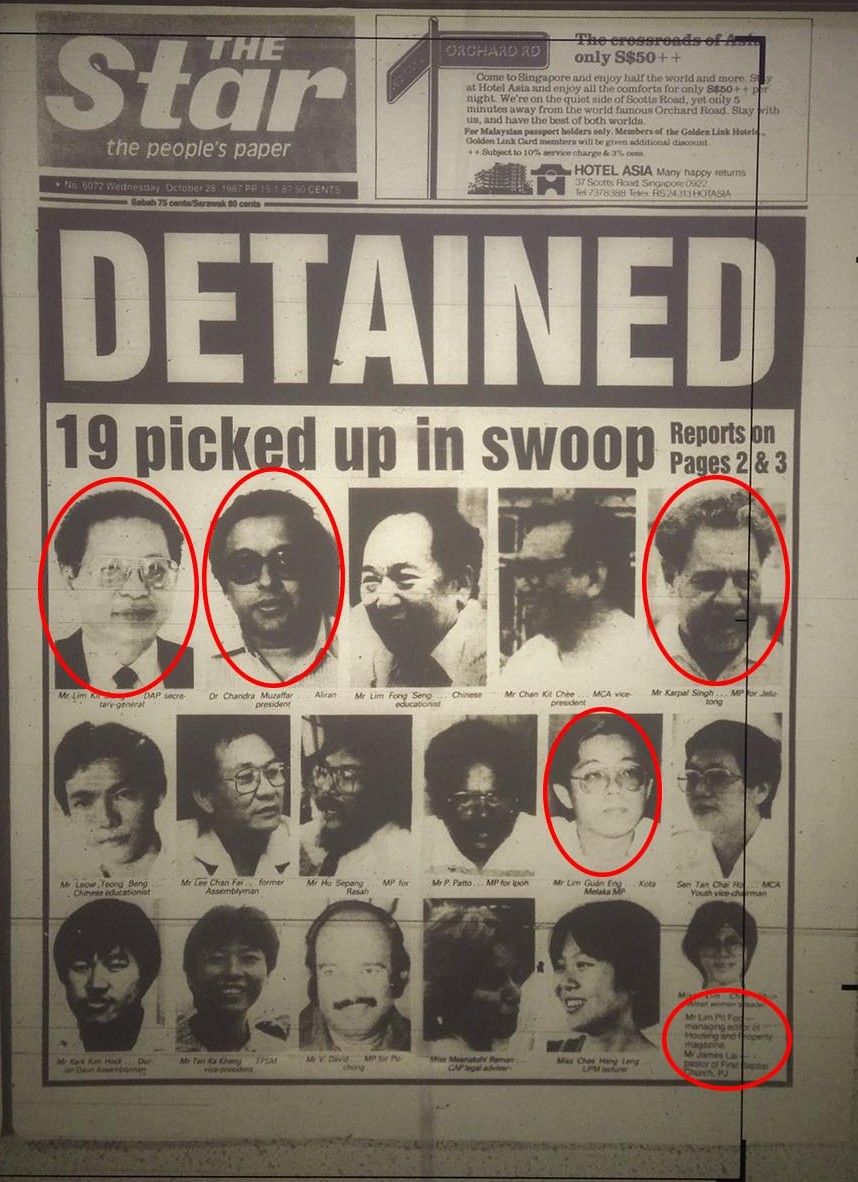
A good gardener would tell you that the main enemies of a beautiful garden are weeds. Weeds stick out like a sore thumb and mar what would otherwise be an impeccable landscape, and are seen as a nuisance that have to be plucked and destroyed.
In this case though, the “garden” was Malaysia, and the “weeds” were people and organizations that refused to become part of the landscape that the government wanted to grow. And so, on October 27th 1987, a weeding operation was carried out – an operation officially named Ops Lalang.
It started with the first 19 people being plucked and shipped off to Kamunting under the ISA for being a “threat to national security,” and ending with an official tally of 106 people by the end of the operation. Some of the more notable people in this initial swoop were (circled above) Lim Kit Siang, Karpal Singh, Lim Guan Eng, Chandra Muzaffar, and, strangely enough, a property magazine editor and a church pastor.
To put things in perspective, Anwar is prevented from speaking before he faces trial. The people detained in Ops Lalang weren’t trialled, they weren’t given a chance to speak. They were put in an isolated camp – some of them for two years or more.
But we haven’t reached the bad part yet.
Nothing prepared readers for what they were about to read the next day:
Nothing. They read nothing.
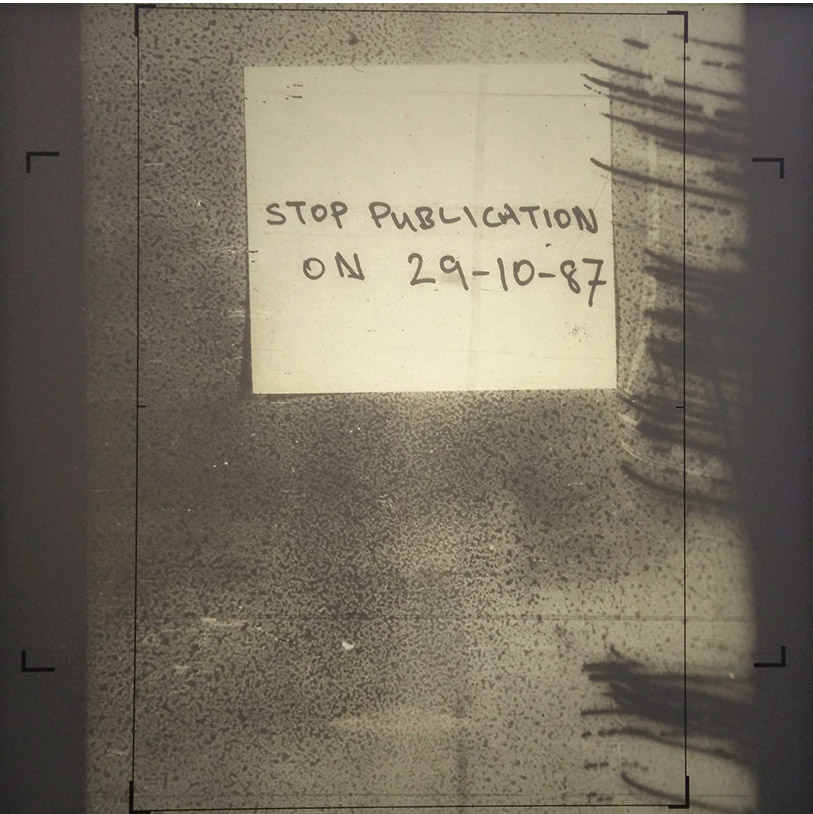
On October 29th, The Star, along with Sin Chew Jit Poh and Watan, had their publishing permits withdrawn by the Home Ministry.
After a hard day’s work, the garden was beautiful again.
6 months later, the Star returns…
It’s almost impossible to write a story without a hero. If the hero dies, the role is either taken up by another character or the character somehow comes back from the dead *coughMARVELCOMICScough* *coughDCcough*
But before that though, there’ll always be that period of hardship and pain that takes place during the hero’s absence. In our story, this was felt by the hundreds of employees whose jobs and livelihoods were now in limbo. A (now ex-) Star reporter who went through The Star’s closure recounts his experience of uncertainty and of making ends meet:
“We survived on one-third salary. My wife, also a Star employee, found work as a part-time typist … so we could pay the rent and interest on the [housing] loan. After nearly five months, … I was close to panic mode: the savings had almost disappeared … We sold our video cassette recorder to get some extra cash…” – Purwaiz Alam, Tales of the Dark Days II.
And then, with great fanfare, the hero would miraculously show up again and save the day!
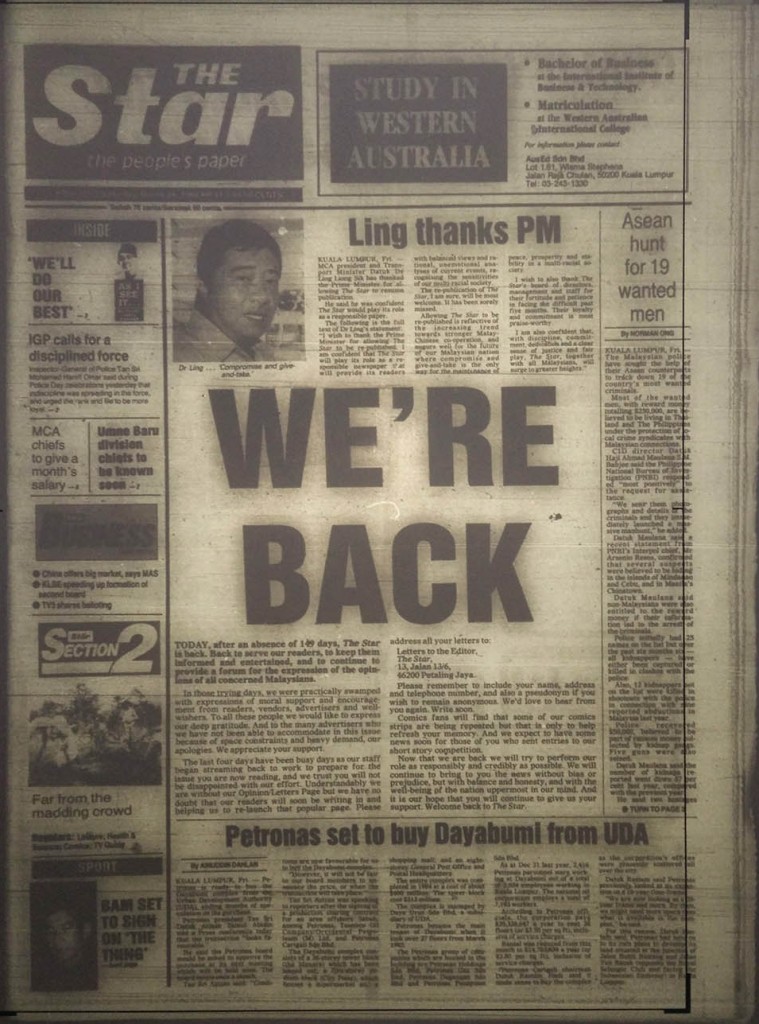
A little shy of 6 months later, readers were greeted with copies of The Star back on the news stands. The day was saved, and it looked like things were back to normal.
“… a week later, the good news came … Our relief knew no bounds. We had been “saved”” – Purwaiz Alam, Tales of the Dark Days II.
… but something seems different.
[On] the first day that the Star re-opened, most of us knew things would never be the same any more. The journalism that we had learnt and knew well would wither away soon enough. As the months went by, it became obvious that my job (and that of hundreds others) had been saved at a price, a very hefty price. – Purwaiz Alam, Tales of the Dark Days II.
In some story arcs, when the main character comes back after an absence, something has… changed. He might look almost the same appearance-wise, but something is different inside – almost as if under the influence of an unseen force.
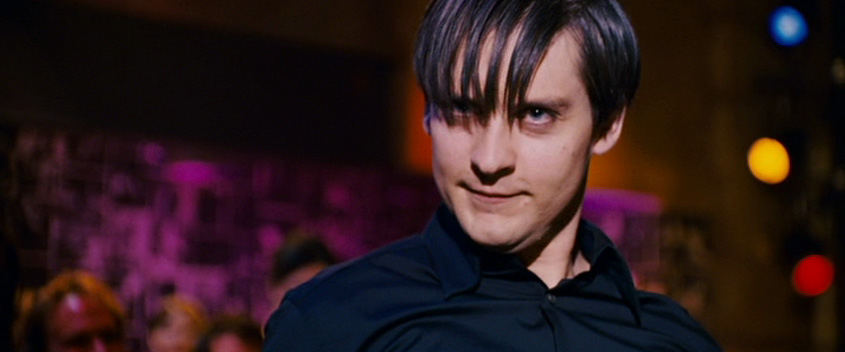
In the six months since the licenses were revoked, many changes were made internally within The Star and the publishing industry as a whole. The Printing Presses and Publications Act was amended to ensure tighter control, but by this time newspapers had already started self-censoring in order to not be the next Star, Sin Chew, or Watan.
“You have no idea; I suffered marginalisation, I was punished, and I received countless memos from my editor-in-chief.” – Kee Thuan Chye (Former NST journalist), quoted in Selangor Times
Upon its first issue on March 26th, The Star was already under a new editorial team and, by many accounts, took on a pro-government stance. Sin Chew on the other hand fought tooth and nail to remain open and eventually found itself a new owner, and as for Watan, well… unfortunately luck did not come in threes as they closed down for good in 1996.
All these changes were quickly noticed by reporters who went through that period,
“In my experience there have been occasions when the owners or publishers held back certain reports and interviews …One was an exclusive on alleged abuse in detention centres of illegal migrants, that had to be cancelled and printed copies destroyed after the media owner read the reports.” – Chong Cheng Hai (Former Star journalist), quoted in Selangor Times
and many eventually left for international news agencies or (in later years) moved to digital media.
The Tunku’s little Star, all grown up
Taking into consideration Tunku’s relationship with certain political figures in power at the time (We’re not gonna discuss it. Nanti kena sedition. You can read it yourself here) as well as his more liberal political, religious, and racial views; this would have been something that needed changing.
Over the next few days of The Star’s reopening in 1988, this connection was pointed out in one of the “welcome back” columns:
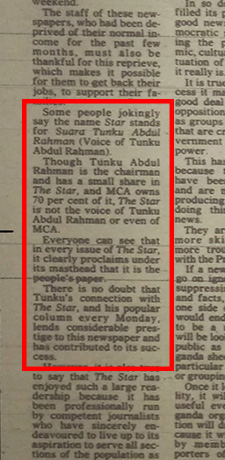
Tunku himself brought up his thoughts on his reasons for the revoking of The Star’s publishing license.
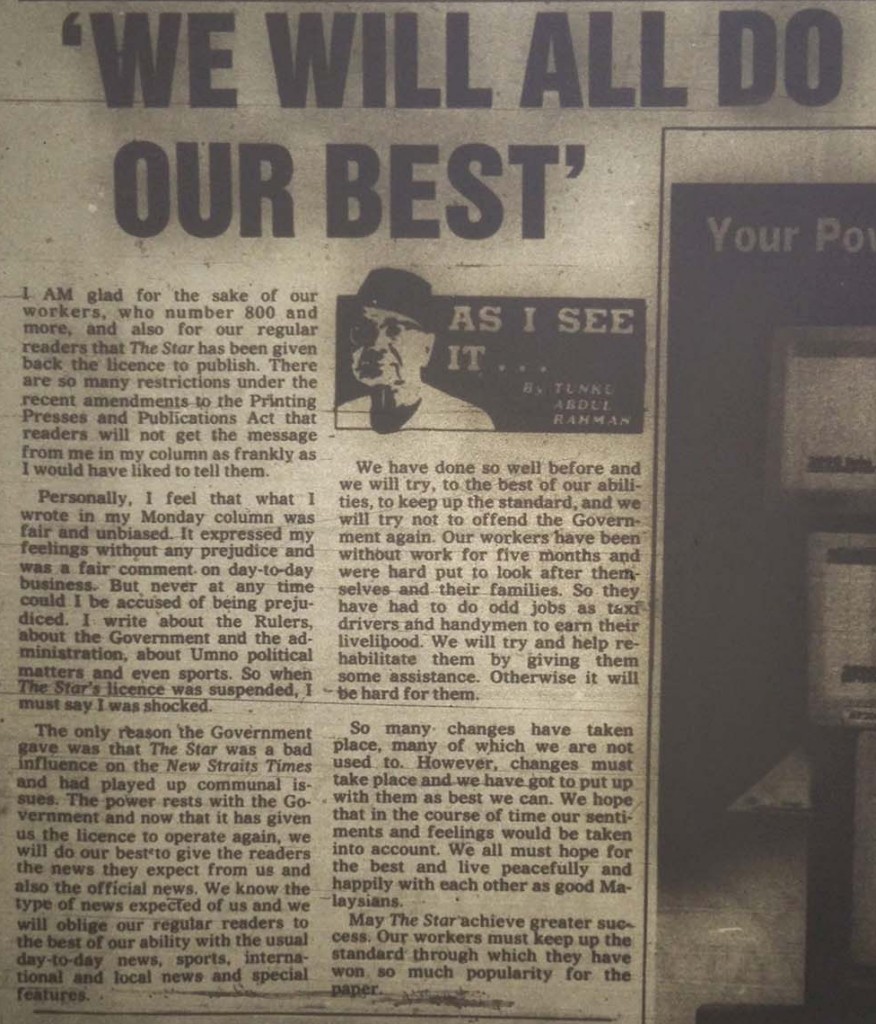
And, at least for the next two months that we looked at, this was his last column at his little Star.
The epilogue.
“Being liberal to them is like offering a flower to a monkey. The monkey would rather tear the flower apart than to appreciate its beauty” – Dr. Mahathir bin Mohamad
As mentioned, this story is meant to be a scary one. We are quite sure that it would be for journalists today, and definitely so for those involved in Ops Lalang; but how would it be scary 27 years later? For people like you and me?
The growing view of bias and unfair reporting in newspapers has created a push towards online news portals (when the internet age came about, at least) which are generally seen as being more reliable but also created an open field for journalists and commenters alike to express their own views to the masses. In recent times though, the number of sedition charges placed against those who expressed or reported their views online has drawn comparison to the Ops Lalang of 1987, leading some to call our current situation “Ops Lalang 2”
There are also those in rural areas that may not have access to the internet and still heavily rely on the newspapers to shape their local worldview. Newspapers that still publish under fog of Black October.
Perhaps that is the scariest story of all.
But really, isn’t it so coincidental that Anwar’s trial was set on the same day as Ops Lalang? And we all know how that turned out.
- 9.5KShares
- Facebook9.2K
- Twitter30
- LinkedIn26
- Email67
- WhatsApp153

